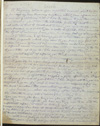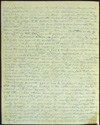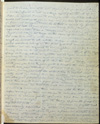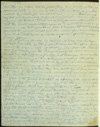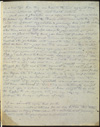Mahatma Letter No. 114: Difference between revisions
Pablo Sender (talk | contribs) No edit summary |
|||
| (10 intermediate revisions by 3 users not shown) | |||
| Line 1: | Line 1: | ||
{{Infobox MLbox | {{Infobox MLbox | ||
| header1 = People involved | | | header1 = People involved | | ||
| Line 11: | Line 7: | ||
| writtendate = unknown | | writtendate = unknown | ||
| receiveddate = October 8, 1883 - see [[Mahatma Letter No. 114#Context and background|below]] | | receiveddate = October 8, 1883 - see [[Mahatma Letter No. 114#Context and background|below]] | ||
| otherdate = | | otherdate = unknown | ||
| header3 = Places | | header3 = Places | ||
| sentfrom = unknown | | sentfrom = unknown | ||
| receivedat = London | | receivedat = London | ||
| vialocation = | | vialocation = unknown{{pad|9em}} | ||
}} | }} | ||
''' | This is '''Letter No. 114''' in ''' [[The Mahatma Letters to A. P. Sinnett (book)|''The Mahatma Letters to A. P. Sinnett'']], 4th chronological edition'''. It corresponds to '''Letter No. 83''' in '''Barker numbering.''' This letter seems to precede the unpublished letter '''[[Mahatma_Letter_of_Sinnett_to/from_KH_-_1883-10-09|written on October 9, 1883]]'''; both deal mostly with organizational matters such as the [[Phoenix Venture|Phoenix venture]]. | ||
<br> | <br> | ||
<br> | <br> | ||
| Line 68: | Line 64: | ||
{{Col-begin|width=98%}} | {{Col-begin|width=98%}} | ||
{{Col-break|width=55%}} | {{Col-break|width=55%}} | ||
good to India, even at the cost of your feelings and pecuniary interests. I should be most unwilling, apart from the rule of [[Brotherhood of Adepts|our Order]] as regards [[Karma]], to draw you into a position where I could not recompense you in any way for loss of social prestige or financial disappointments. To do that is beyond my power. I could not look at you, if you were hourly feeling that you were regarded no better than a "blackguard," and had "no political weight with Society at large on the score of Character." If your lot was to be cast in with ours, such considerations would not weigh one moment | good to India, even at the cost of your feelings and pecuniary interests. I should be most unwilling, apart from the rule of [[Brotherhood of Adepts|our Order]] as regards [[Karma]], to draw you into a position where I could not recompense you in any way for loss of social prestige or financial disappointments. To do that is beyond my power. I could not look at you, if you were hourly feeling that you were regarded no better than a "blackguard," and had "no political weight with Society at large on the score of Character." If your lot was to be cast in with ours, such considerations would not weigh one moment: to all, whether [[Chohan]] or [[chela]], who are obligated workers among us the first and last consideration is whether we can do good to our neighbour, no matter how humble he may be; and we do not permit ourselves to even think of the danger of any contumely, abuse or injustice visited upon ourselves. We are ready to be "spat upon and crucified" daily — not once — if real good to another can come of it. But the case is totally different with you; you have your path to tread in the more "practical" world, and your standing in it must not be jeopardized. | ||
Again, besides yourself the contributors to capital must be justly dealt by. Among them are wealthy Zemindars, but there are also poor patriots, who have made great exertions to subscribe their small sums from pure reverence to us and love of mother-land. At least fifty such are waiting the latest turn of events, and husbanding their resources until the last moment before sending on their remittances to Calcutta. Devoted [[Theosophist]]s in various parts of India have been actively soliciting for subscriptions, upon the theory of possible profit to capital set forth in Mr. Morgan's circulars; the project has been warmly advocated by [[Henry Steel Olcott|Olcott]], [[Lt. Col. W. Gordon|Colonel Gordon]], [[Norendro Nath Sen|Norendro]], and others known and unknown to you: a financial disaster to [[Phoenix Venture|The Phoenix]] of the nature you anticipate would compromise the personal influence of all. With such prospects, moreover, your late co-adjutor Mr. Dare, would not care to help you | Again, besides yourself the contributors to capital must be justly dealt by. Among them are wealthy Zemindars, but there are also poor patriots, who have made great exertions to subscribe their small sums from pure reverence to us and love of mother-land. At least fifty such are waiting the latest turn of events, and husbanding their resources until the last moment before sending on their remittances to Calcutta. Devoted [[Theosophist]]s in various parts of India have been actively soliciting for subscriptions, upon the theory of possible profit to capital set forth in Mr. Morgan's circulars; the project has been warmly advocated by [[Henry Steel Olcott|Olcott]], [[Lt. Col. W. Gordon|Colonel Gordon]], [[Norendro Nath Sen|Norendro]], and others known and unknown to you: a financial disaster to [[Phoenix Venture|The Phoenix]] of the nature you anticipate would compromise the personal influence of all. With such prospects, moreover, your late co-adjutor Mr. Dare, would not care to help you | ||
| Line 85: | Line 81: | ||
{{Col-end}} | {{Col-end}} | ||
== Page 4 == | == Page 4 == | ||
| Line 104: | Line 99: | ||
{{Col-break|width=30%}} | {{Col-break|width=30%}} | ||
'''NOTES:''' | '''NOTES:''' | ||
* | *'''the seismological phenomena of late occurrence''' is obviously the great Krakatau blast and eruption on August 27, 1883. That day the four huge explosions almost entirely destroyed the island. | ||
{{Col-end}} | {{Col-end}} | ||
| Line 128: | Line 123: | ||
{{Col-break|width=30%}} | {{Col-break|width=30%}} | ||
'''NOTES:''' | '''NOTES:''' | ||
*'''Peling''' is a Tibetan word meaning outsider or foreigner, particularly a Westerner. | *'''Fiat''' "Decree" or "Command." | ||
*'''Peling''' (''phyi-gling'', 'outer continent') is a Tibetan word meaning outsider or foreigner, particularly a Westerner. | |||
*'''The Replies to Mr. Myers''' probably refers to the article "Reply to an English F.T.S." published in [[The Theosophist (periodical)|''The Theosophist'']] 4:12 (September 1883), pp. 296-310, extending to the October and November issues. | *'''The Replies to Mr. Myers''' probably refers to the article "Reply to an English F.T.S." published in [[The Theosophist (periodical)|''The Theosophist'']] 4:12 (September 1883), pp. 296-310, extending to the October and November issues. | ||
| Line 135: | Line 131: | ||
== Context and background == | == Context and background == | ||
This letter deals mostly with the the [[Phoenix Venture|Phoenix venture]], which was an attempt to organize a newspaper to be called ''The Phoenix'', supported by Indian capital. Sinnett, who was losing his job at ''The Pioneer'', was to be the editor. The letter seems to precede the unpublished letter '''[[Mahatma_Letter_of_Sinnett_to/from_KH_-_1883-10-09|written on October 9, 1883]]''', which deals mostly with the | |||
same matters. | |||
== Physical description of letter == | == Physical description of letter == | ||
| Line 151: | Line 149: | ||
== Notes == | == Notes == | ||
<references/> | <references/> | ||
[[Category:ML from Koot Hoomi]] | |||
[[Category:ML to A. P. Sinnett]] | |||
[[Category:ML with images]] | |||
[[Category:ML needs commentary]] | |||
Latest revision as of 17:53, 29 November 2022
| Quick Facts | |
|---|---|
| People involved | |
| Written by: | Koot Hoomi |
| Received by: | A. P. Sinnett |
| Sent via: | postal mail |
| Dates | |
| Written on: | unknown |
| Received on: | October 8, 1883 - see below |
| Other dates: | unknown |
| Places | |
| Sent from: | unknown |
| Received at: | London |
| Via: | unknown |
This is Letter No. 114 in The Mahatma Letters to A. P. Sinnett, 4th chronological edition. It corresponds to Letter No. 83 in Barker numbering. This letter seems to precede the unpublished letter written on October 9, 1883; both deal mostly with organizational matters such as the Phoenix venture.
< Prev letter chrono
Next letter chrono >
< Prev letter Barker
Next letter Barker >
Page 1 transcription, image, and notes
|
A temporary absence upon imperative business, prevented for a few days my even knowing anything about your affairs, and it was not until to-day that I had the leisure to give them a thought. Upon reading your letter, the situation presented itself to me in such colours that I concluded to have you immediately given your freedom and so sent you a cable despatch. This was with the object of removing from your mind any feeling of compulsion, moral or otherwise, and of leaving you to either take or reject the further proposals which may come to you from any part of India, at your option. If any consideration could have prompted a different course, it would have been entirely removed by the tone of your letter of August the 16th. The advocacy of the Bengal measure in the present aspect of affairs you think would ruin every prospect of the commercial success of the proposed journal, "The Phoenix cannot possibly as now designed prove a commercial success. And a paper which is a commercial failure can have very little political weight." To persist then, would as you see it, be to lead a number of persons to fruitlessly waste a large sum of money. For "the project thus crippled is pretty effectually stripped of its grand financial possibilities." Still despite all this, you are disposed to go on if I wish it, cast the moral responsibility on me and "swallow the somewhat repulsive pledge." My friend, you shall do nothing of the sort. The responsibility, notwithstanding all I could, and am willing to do, would fall upon you since you have been given plainly the option in my last letter to you. If henceforth, you have anything more to do with this unfortunate affair, it must be entirely upon your own judgment and responsibility. You have ill comprehended the Law of Karma — (and my letter) — if you could have imagined that I would dare to provoke its awful retaliations by forcing you or anyone to take up a line of action with such feelings in his heart. Knowing you, it was easy to foresee your — (nay, the feelings of any honourable man having to face |
NOTES: |
Page 2
|
such a situation) — repulsion for the work contemplated. Therefore, had I taken great care to impress upon you, in my letter that you were entirely and absolutely free in your choice. I blame myself for but one thing, viz., my having hinted at the probable consequence of your refusal, — as implied in my pledge to the Chohan to thenceforward abstain from collaboration with Europeans until some future and more favourable time. It was that which caused you "to swallow the repulsive pledge" more than anything said. This goes to my Karma. But, this aside, by referring to my last letter, you will perceive that the necessity for independent, unbiased action on your part was strongly urged. I hoped — even against the disheartening moral condition of my countrymen, and forced myself almost to believe it possible to found a journal so obviously necessary at this great crisis, upon a basis thoroughly satisfactory to you and to all who might be concerned. I had forgotten that external appearance is everything in your world and that I was simply subjecting you to be regarded with contempt. But rest assured: had the money been collected as first attempted, and no pressure of working in a certain direction had been offered to you; and had you been left entirely your own master in the line of policy pursued; yet at this hour of bitter hatred, of mutual malice and contempt, the mere fact that you were advocating the cause of the despised, and now more than ever hated and crushed down "nigger" — would have stripped The Phoenix of even a shadow of any "grand financial possibility." Still hardly a month ago I was so confident — from seeing the still deep, strong feelings lurking in the national soul — that I allowed you to grow equally and even more confident than myself. Others, whose intuition and foresight had not been blinded by their superiors, thought differently and some would have dissuaded me; yet, the aim being so worthy, and the possibility really existing, I was permitted to watch the project and use natural external means to aid its consummation. If indefinite waiting were practicable for you, the original scheme could be realized; but this is not so, and I must, therefore, withdraw the last appearance of constraint upon your free judgment, and thank you for having so loyally seconded the attempt to do |
|
NOTES:
|
Page 3
|
good to India, even at the cost of your feelings and pecuniary interests. I should be most unwilling, apart from the rule of our Order as regards Karma, to draw you into a position where I could not recompense you in any way for loss of social prestige or financial disappointments. To do that is beyond my power. I could not look at you, if you were hourly feeling that you were regarded no better than a "blackguard," and had "no political weight with Society at large on the score of Character." If your lot was to be cast in with ours, such considerations would not weigh one moment: to all, whether Chohan or chela, who are obligated workers among us the first and last consideration is whether we can do good to our neighbour, no matter how humble he may be; and we do not permit ourselves to even think of the danger of any contumely, abuse or injustice visited upon ourselves. We are ready to be "spat upon and crucified" daily — not once — if real good to another can come of it. But the case is totally different with you; you have your path to tread in the more "practical" world, and your standing in it must not be jeopardized. Again, besides yourself the contributors to capital must be justly dealt by. Among them are wealthy Zemindars, but there are also poor patriots, who have made great exertions to subscribe their small sums from pure reverence to us and love of mother-land. At least fifty such are waiting the latest turn of events, and husbanding their resources until the last moment before sending on their remittances to Calcutta. Devoted Theosophists in various parts of India have been actively soliciting for subscriptions, upon the theory of possible profit to capital set forth in Mr. Morgan's circulars; the project has been warmly advocated by Olcott, Colonel Gordon, Norendro, and others known and unknown to you: a financial disaster to The Phoenix of the nature you anticipate would compromise the personal influence of all. With such prospects, moreover, your late co-adjutor Mr. Dare, would not care to help you |
|
NOTES:
|
Page 4
|
even though Mr. Allen should permit him. And, finally, unless your personal faith in me were so blind as to swallow up your last instinct of prudence, you would not risk your own hard-earned capital in a fore-doomed failure, and so could not in conscience allow anyone else to do it. Except — except you were allowed to "cast the moral responsibility upon me"; in short, to make me by miracle — were that possible — force a success. If that had been permitted, the journal would have been already founded, and its voice have made itself heard amid the harsh din of contemporary Indian affairs. I would have phrased my dispatch of to-day even stronger but that I should, by telling you to abandon the affair, again assume the responsibility of blocking your free-will. It is best that you should give the Bengal party the chance to state their conditions definitely and finally, and thereupon answer "yes" or "no." To save your time and expense I asked Olcott to cause Norendro Babu to send him the Landholders' proposals, that he may, upon the instant — knowing your views and character — say whether they are fit to lay before you or not. And if not, that he will immediately communicate with your Calcutta solicitors, as you requested. This is the present situation of affairs and very bad it is for India. It is premature as yet to tell you more of the secret influence that has brought it on, but you may hear of it later. Nor may I forecast the future, except so far as to draw more than ever your attention to the black clouds that are gathering over the political sky. You know I told you long ago to expect many and great disturbances of all kinds as one cycle was closing and the other beginning its fateful activities. You already see in the seismological phenomena of late occurrence some of the proof; you will see a great many more and shortly. And if we have to regret the blasting of a humanitarian project, it should at least mitigate the severity of your disappointment to feel that |
|
NOTES:
|
Page 5
|
in a bad time like this one has to contend against seen and unseen influences of the most hostile nature. And now, a pleasanter word before concluding. Your decision to follow my lead into the Phoenix matter even with the, to you, certainty of social degradation and pecuniary loss, had the reward of its Karma already. So I conclude, at any rate, by the results. Though there was no test — (so odious to you) — meant, yet you were as good as tested and you have not quailed. The fiat of contingent non-intercourse between us has been partially revoked. The prohibition with regard to other Europeans is as strict as ever, but in your case it is removed. And this consent, I know, has a direct bearing upon your consent — the great sacrifice of your personal feelings in the present situation. "This Peling" was found to have "really redeeming qualities!" But be warned, my friend, that this is not the last of your probations. It is not I who create them, but yourself — by your struggle for light and truth against the world's dark influences. Be more careful as to what you say upon forbidden topics. The "eighth sphere" mystery is a very confidential subject, and you are far from understanding even its general aspect. You were repeatedly warned and should not have mentioned it. You have unintentionally brought ridicule upon a solemn matter. I have nought to do with the Replies to Mr. Myers, but, you may recognise in them, perhaps, the brusque influence of M. I am advised to request that, for the future, communications intended for me may be sent thro' either Damodar or Henry Olcott. Madam B's discretion is not improving in ratio with her physiological enfeeblement. |
|
NOTES:
|
Context and background
This letter deals mostly with the the Phoenix venture, which was an attempt to organize a newspaper to be called The Phoenix, supported by Indian capital. Sinnett, who was losing his job at The Pioneer, was to be the editor. The letter seems to precede the unpublished letter written on October 9, 1883, which deals mostly with the same matters.
Physical description of letter
The original is in the British Library, Folio 3. George Linton and Virginia Hanson described the letter this way:
In KH script on three sheets of full-sized white paper. The first page is in blue ink which changes to green on the back. The second page is in green ink and the third page is green and blue intermingled.[1]
Publication history
Commentary about this letter
Notes
- ↑ George E. Linton and Virginia Hanson, eds., Readers Guide to The Mahatma Letters to A. P. Sinnett (Adyar, Chennai, India: Theosophical Publishing House, 1972), 183.
